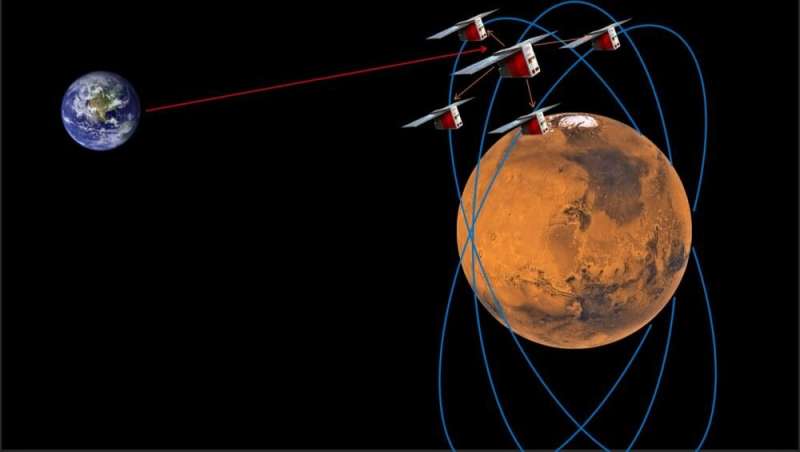Rovers that will operate near the north pole of Mars will need an autonomous navigation system. The researchers propose to build it on the basis of a swarm of simple satellites in its orbit, constantly exchanging data.

Rovers on Mars need a navigation system
In the last two decades, rovers like Perseverance have proven themselves well as a means of reconnaissance and exploration of the red planet. However, they landed in areas where it is easy to keep in touch and control them.
The most interesting places on Mars are located near its poles and in other hard-to-reach places like the narrow and deep Mariner Valley. There are hidden answers to many mysteries related to the geology of the planet and its climate. But for their research, rovers need more autonomy.
It, in turn, means the need to create a satellite navigation system. Now communication and navigation for rovers are provided with only a few devices in orbit. In order to explore the poles of Mars, scientists are developing more advanced systems.
Navigation system for Mars
One of the variants of the navigation system for Mars was developed by researchers from the Faculty of Mechanical Engineering and Aerospace Engineering of Sapienza University in Rome, who proposed their solution to this problem.
According to their published article, the basis of the navigation system for Mars should be a swarm of relatively small and simple devices. They will create several navigation nodes that can operate completely autonomously from the Earth.
Research devices that land or operate on the surface will not have to rely on signals from the Earth, which come with a significant delay. Instead, they will receive all the necessary data from these little helpers.
The grouping will function thanks to the technology of inter-satellite communication, which allows them to freely exchange data. The researchers suggest using the ANDROMEDA system, which is similar to the one previously used in the GRACE and GRAIL missions.
Possible problems with system deployment
Currently, researchers have proposed two variants of the navigation system. Each of them involves the creation of a grouping of five satellites. Thanks to this, rovers on Mars will be able to constantly determine their coordinates, even if they are in such a narrow and long valley as the Chasma Boreale.

But to do this, developers need to know more about conditions near other planets, which can be very different from those on Earth. For example, we know enough about the gravitational anomalies of Mars thanks to such missions as Mars Reconnaissance Orbiter and Mars Global Surveyor. However, its radiation fields and thermal environment remain poorly understood and may affect the operation of small satellites.
According to phys.org
Follow us on Twitter to get the most interesting space news in time
https://twitter.com/ust_magazine

